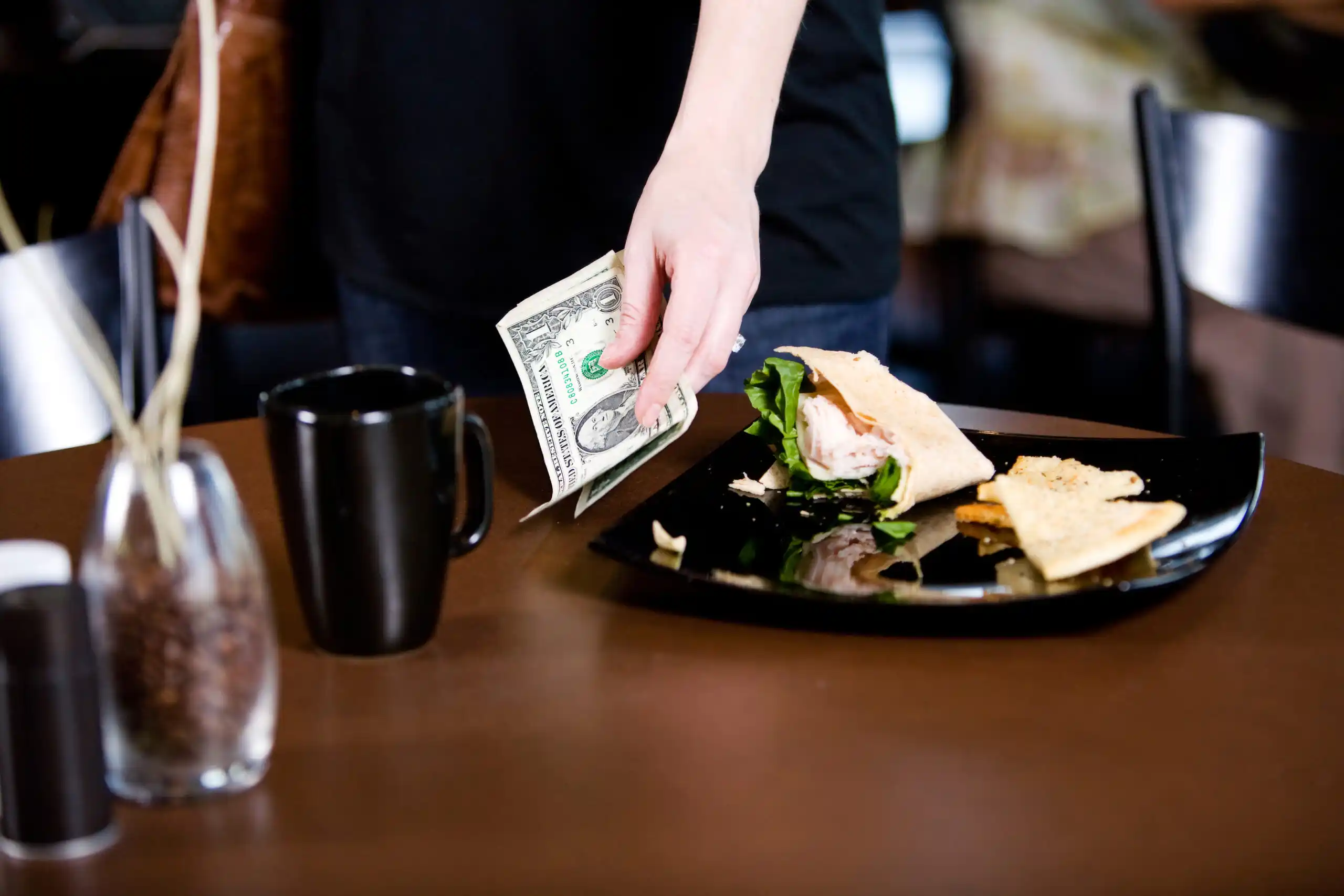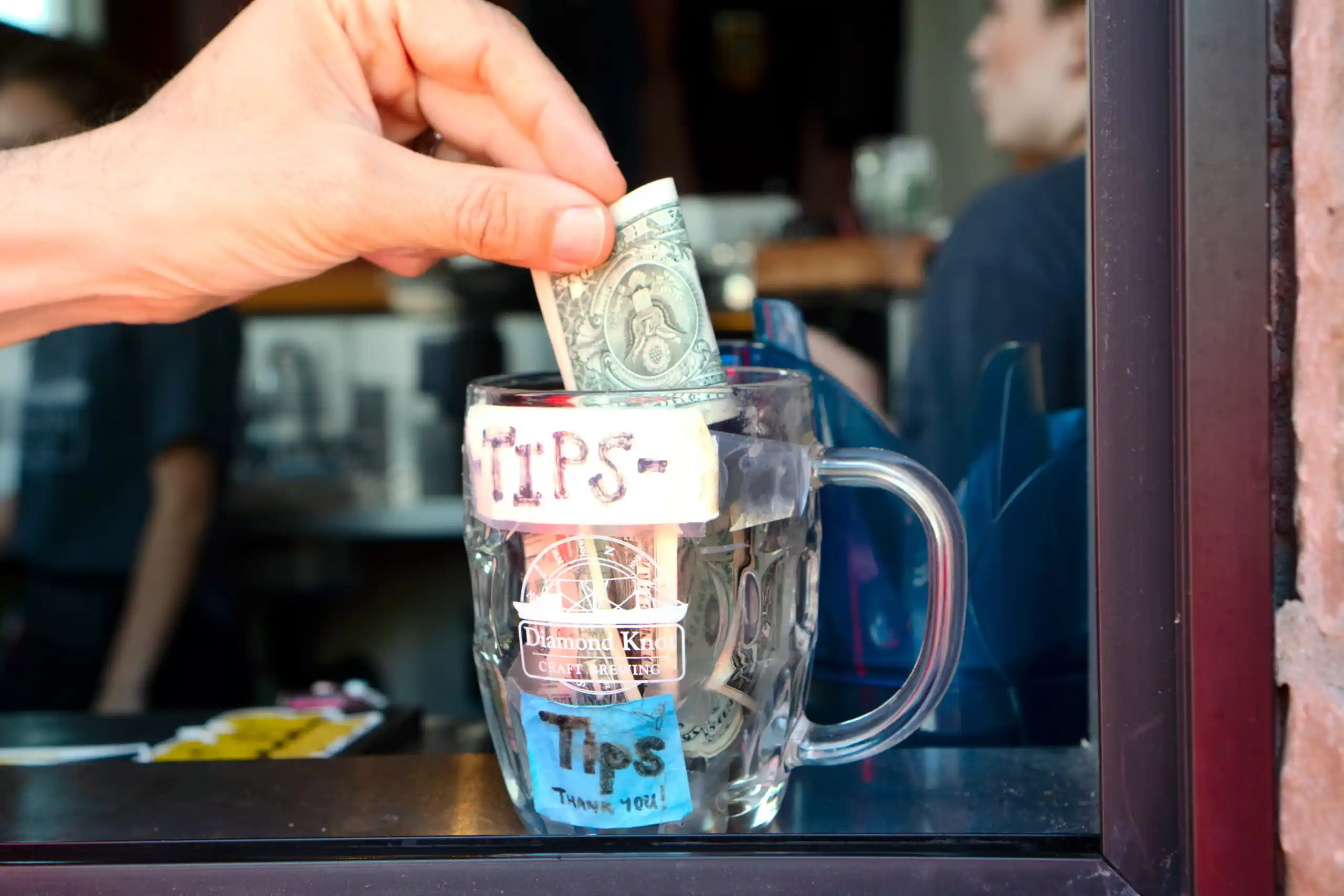Recently, a restaurant tried to scam me. Even worse, they actually succeeded! It was minor, but I’m still kicking myself over not noticing it at the time. Here’s what happened. The other day, I went out dinner with my cousin. (It was delicious, by the way.) Once the bill arrived, the waitress whipped out the nifty handheld credit card machine that we all know and love. This version had features that let you add on a tip automatically and pay right at the table — you’ve probably seen them in your local restaurants too. Unfortunately, I wasn’t paying very close attention.
How I Messed Up
I remembered clearly that I selected the 18% option. Then I punched in my email address to get a digital receipt. However, when I looked at the bill the next day, the tip amount Define: tip amount An amount of money you leave that is above and beyond the required cost of the good or service. was something over 20%. The total didn’t seem right at first glance. After a bit of quick math, it turned out that I was charged a tip of 21.57% of the after-tax total. What?
After that, I tried to calculate the tip based on the before tax total. But none of those numbers worked out to a nice round 18% either. The final total of the bill wasn’t rounded to the nearest dollar, so that’s wasn’t the issue either. Yeah, I should have noticed while I was paying. But I just trusted that the 18% button would do what it promised.
My wife told me I should call the restaurant or try to dispute the charge with the credit card company. I really should, if only for the principle of the matter. On the other hand, the difference was only a dollar or two. I really just don’t want to spend my time dealing with multiple phone calls over such a small amount. Maybe it was even an honest mistake with the payment machine (but I doubt it). I hate the feeling of letting a bad actor get away with something like this, but maybe it’s best to just let it go.
The Pandemic Did a Number on the Restaurants
I should really be angry about the whole ordeal. Instead, I mostly just feel bad for the restaurant and the servers. The pandemic caused a pretty seismic shift in demand for more than a year. Many restaurants were closed for weeks or months at a time, or forced to rely solely on takeout or delivery for long stretches. We are just now starting to return to normal.
Maybe they are playing games with the tips because they need to. I can see how both restaurants and their servers would need to make up for lost time by finding ways to get more tips. I usually tip 15% for sit-in dinners (not for takeout). Lately, though, I find myself trying to tack on just a bit more in an effort to show my support for local businesses and their staff.
Tips Aren’t Just for Servers
Even with takeout, you have to remember that tips aren’t just for the servers but shared by everyone on the floor. It’s natural to give a better tip when service is good and not want to give too much when the server isn’t quick or friendly. The reality though is that the tip you give is shared by not just the server but the bust boys that help out and even the bartenders. In some cases, even cooks and dishwashers can share your tips.
And plus, it might not even be the server’s fault if the food is bad or slow to come out. It could be the cook’s fault, or it could just be how the restaurant is understaffed. Not everything is in the server’s control, so don’t ever skip the tip even if service was bad because you aren’t just teaching the server a lesson but you are punishing a whole chain of staff.
Don’t Leave a $0 Tip
Please don’t do this. Apparently, some people think this will teach the server a lesson after a less-than-desirable dining experience. But it’s selfish and often short-sighted. It’s probably not the server’s fault that the kitchen was slow or the manager didn’t schedule enough staff. Please keep in mind that many servers are legally paid much less than minimum wage, with the expectation that tips will make up the difference.
Leaving a $0 tip absolutely teaches no one a lesson. All you did was take money out of someone’s pocket for something that was likely out of their control. If the food wasn’t cooked well enough or the service was slow, leave a tip anyway — at least 10% — and then ask to speak to the manager. Politely express your concerns to them, and hope that your feedback will help everyone get better.
Leaving nothing for a tip is just tacky and cheap. The servers won’t think, “Oh, they were displeased with their service” and try to be better. They’ll just (correctly) assume you’re a cheap jerk. It accomplishes nothing. You can certainly tip more for good service, but don’t tip considerably less for subpar service. And if you can’t afford to tip, then you can’t afford to dine out. It’s expected as part of the experience, so don’t skip the tip just because it’s technically (and legally) not required.
Is 18% the Norm Now?
It wasn’t that long ago that every tipping guide article would definitely proclaim that 15% was the standard acceptable tip rate for most things. These days, though, we’re starting to see 18% become the standard in more and more places. Yes, even before the pandemic hit. Apparently tipping isn’t immune to inflation either. Some restaurants now only include “suggested tip amounts” of 18%, 20%, or 22%. If you’re still tipping 15%, you might have to do it manually. Or better yet, consider upping your amount slightly.
Luckily, this practice of 18% hasn’t spread much outside of mid-to-high-end restaurants yet. You likely won’t see these recommendations at takeout joints or coffee shops. I don’t mind tipping for a cup of coffee, but I’m pretty sure I would just click “no tip” if the smallest suggested tip for a cup of joe was 18%.
 Shutterstock
ShutterstockTip More For Better Service
Like it or not, getting more money makes everyone happy. And happy people are friendlier. If you want better service, then consider being a generous tipper. This is especially true if you are paying upfront or are a repeat customer.
My uncle is a very successful businessman. He once told me that he purposely goes to a handful of restaurants and tips quite generously. He knew that he would get amazing service when he returned, which he routinely does with clients or employees. Everyone’s experience is better when the servers and other staff are friendly and extra attentive to your dining needs. He claims to have paid hundreds (if not thousands) of extra dollars in tips, in order to maintain happy clients and appreciated employees.
Should Taxes Be Tipped?
Most people agree that tips should be a percentage of the pre-tax amount. After all, you aren’t getting any extra service from paying government taxes. However, there is really no universal standard. I’ve seen many automated payment systems just add the tip on the after-tax total with their recommended tips. So if you’re a stickler for not tipping on taxes, you’ll have to do your own math.
I have seen some heated arguments on online finance forums about this topic. Some swear that you should always just tip based on the after-tax total. Others religiously omit the taxes before they calculate their desired tip percentage. It seems that everyone has a slightly different opinion. Personally, I’ve always tipped based on the before tax total. I plan to continue doing it that way, unless someone can convince me that times truly have changed. Ultimately, do what you’re comfortable with. Tipping 18% on a $50 tab isn’t going to be much different than tipping 18% on the same $53.17 tab (after taxes).
Restaurants Could Help
I love it when I see a receipt that shows a few suggested tip amounts. The digital payment systems that let you check a box and adds the total for you are even better. Not only does it make things easier for you, it also gives you an idea of what the servers and restaurants expect. Of course, it might also cause you to overpay by a few percentiles, like what happened to me.
Honestly, I never really liked the tipping system. It’s not so much the extra money that I seemingly have to pay. It’s more so that the whole system is entirely subjective. You never really know how much is appropriate. Even worse, servers could start a 10-hour shift with no real idea of how much money they will make that day. If the restaurant is slow or the customers are cheap, they could make drastically less one day than the next. That hardly seems fair.
There are plenty of good arguments that the whole tipping system should be done away with. Restaurant owners should just pay their servers fair hourly wages and adjust their menu prices as needed. Some places have even tried to pioneer that system, with varying degrees of success. Overall, though, tipping is so engrained into our American culture that it’s unlikely to change any time soon.
Tip Standards Around the World
The United States is probably the global leader on pushing the boundaries of tipping. Tips started out at 10%. Then it became 15%. As we already discussed, 18% seems to be the minimum at most restaurant these days. Canada has a slightly lower expectation, but they aren’t far behind our American standards. Asia took a long time to adopt the standard. However, instead of tips they routinely have a 10% service charge. At least it’s mandatory and a fixed amount. Makes things easier on everyone, really.
Japan seems to be holding out. I still remember being taught not to tip in Japan on my honeymoon. In fact, the server there specifically said that they would be offended if you tipped them. In Japan, good service is expected and part of the job. Then again, servers in Japan probably aren’t paid below minimum wage with the expectation that customers will make up the difference with their generosity. On the other hand, you don’t see many Japanese-Americans refusing tips while living in the States. Different cultures, different customs, I guess.
If you’re planning to travel, take a few minutes to research what the tipping customs are in the place you’re visiting. You’ll want to fit in (and not cause any awkward moments or hurt feelings).
Tipping Jars
It wasn’t long ago when seeing a tipping jar at a coffee shop was novelty. Now, tipping at coffee shops (or even fast food counters) is fairly common. It may even be expected one day. I was at a bakery last week and they are also soliciting tips. What gives? Since when were you required to tip for something that you picked up yourself (not delivered) and wasn’t brought to you (like a waiter or waitress would). Should you tip the guy at the Subway counter just because there’s a jar out?
The short answer is: probably not. That being said, there’s certainly no harm is offering a couple extra bucks if you’re able to. Remember that most of these employees are paid near the minimum wage. They may be students trying to fund their education or adults just trying to squeeze out a basic living. Don’t judge them, as the tipping jar might not even be their idea — it could be the manager or owner’s decision.
In short, tipping jars are probably the most “optional” of all tipping possibilities. You can safely ignore them in most cases. On the other hand, your additional support would always be very welcomed.
 Shutterstock
ShutterstockWho Should You Tip?
So this is the $64,000 question, right? Sure, everyone knows that you’re supposed to tip your server at bars or restaurants. But what about your hairdresser? Or your taxi driver? Or the hotel concierge? What about that that annoying dude in the nightclub bathroom, trying to offer your gum and cologne? You could feasibly tip anyone that provides you even the most basic of services, but that seems excessive. I once read an article that suggested tipping your mailman once a year at Christmas or offering your regular FedEx/UPS delivery driver a few extra bucks. That seems like too much to me.
The truth is that there is no hard and fast rule. You should always tip at a sit-down restaurant (just not in Japan!). You should tip anyone delivering food to your door too. If you’re picking up take-out, tipping is more optional. After all, you’re making the effort to pick it up and bring it home. Tipping in coffee shops is also less expected, especially if you’re just grapping something to-go from the counter.
Don’t Be Afraid To Ask
For more personalized services, like haircuts, manicures, or even tattoos, you should definitely tip. If a hotel staffer carries your bags to your room, definitely offer them a few bucks. As a general rule, you should tip your taxi or Uber drivers a little bit too. Most rideshare apps even include the option directly in their software, making it an easy task.
If you find yourself in a situation where you don’t know whether to tip or not, there’s no harm in asking. Just a simple “Hey, are you allowed to accept tips?” is good enough. Some places, like employees at big box department stores, might actually be forbidden from accepting tips. If they say no, then a sincere “thank you” is good enough. If they do accept tips, it never hurts to be generous.
The Bottom Line
At the end of the day, the main thing to remember is that there aren’t any universal standards when it comes to tipping. Don’t get too jaded if you see a tip jar everywhere. Everyone is trying to make a bit more money. You almost have to admire the hustle.
Accepted tipping practices are also evolving. What is considered a generous tip today may be too little in the future. The percentages can’t keep going up forever, though, so it has to stop growing at some point. However, we clearly aren’t at the limit yet so you should expect numbers to increase in the future.
Finally, never leave a $0 tip if the place is clearly expecting a tip. If you feel like the service doesn’t deserve your hard-earned dollars, then just don’t go back. I certainly won’t be going back to the place that charged me extra. You shouldn’t have to deal with bad actors either.








